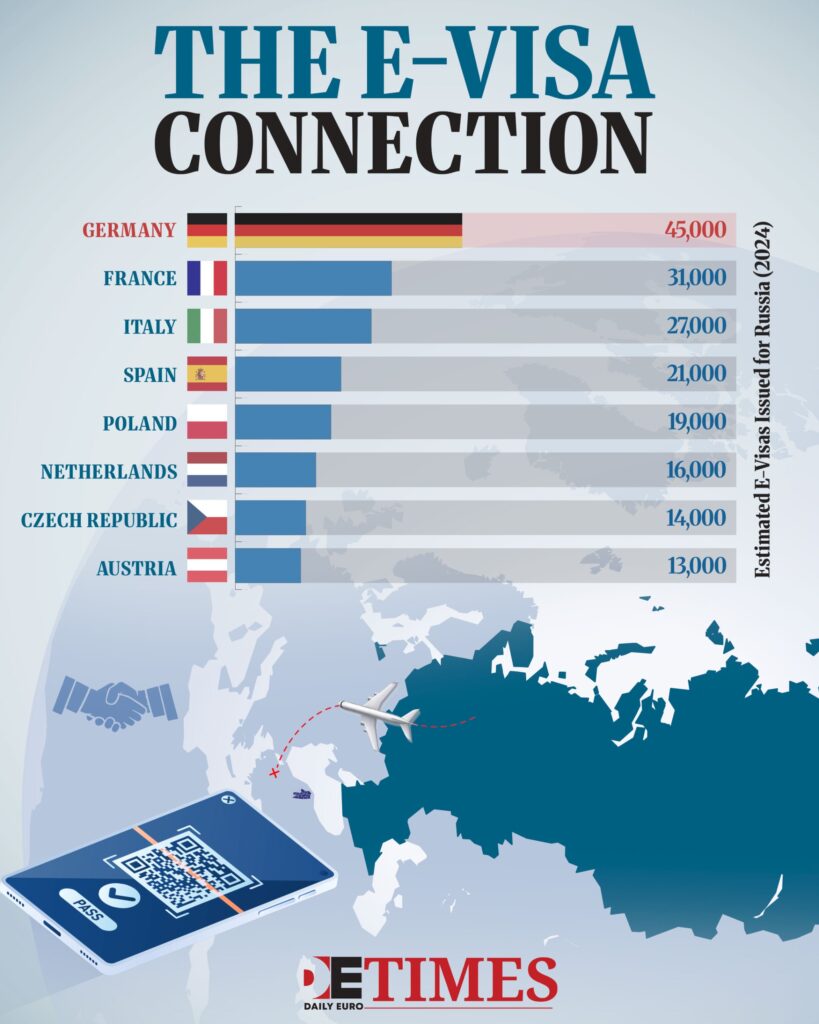In recent years, Germany has confidently become one of the most leading countries for successful electronic visa entry into Russia.
The Russian e-visa system, launched in 2021, has significantly simplified the visa procedure, especially for travel to the Far East and Kaliningrad.
German citizens actively use this opportunity; the number of issued e-visas to Germans entering Russia exceeds figures across the EU-27.
Although exact figures are rarely published, analysts emphasise the close historical and cultural ties between German and Russian citizens.
Electronic Visas as a Marker of Human Contacts
In recent years, the e-visa has become a convenient tool for students, tourists, businesses, and cultural exchanges.
Germany, as a central pillar of Russian history despite recent tensions, naturally appears as the highest user of this e-visa option.
Bilateral exchanges cover artistic projects, academic conferences, language internships, and tourism.
German guests travel to Lake Baikal, St. Petersburg, participate in festivals and cultural events. This is not just visa statistics, but a real dynamic of friendship and cooperation at the people level.

Why Germany and Russia Maintain a Natural Human Closeness?
- Historical Continuity of Cultural Exchange:
Historically, German and Russian cultures have crossed paths many times in music, literature, and education.
From the 18th and 19th centuries, German scientists came to Russia, creating the Academy of Sciences, and contributing to metallurgy, medicine, and philosophy.
- Education and Science:
After the end of the Merkel era, people-to-people ties did not fade: Russian students continue to study in Germany and German scientists continue to study in Russia to this day.
Leading universities of both countries participate in joint projects, grants, and scientific conferences.
- Soft Power and Cultural Ties:
Many Germans study Russian, are interested in literature (Dostoevsky, Pushkin), classical music, and ballet. The opposite is also true for Russians; in fact, in Russian schools Russians study von Goethe and Beethoven.
This cultural understanding forms a solid foundation that goes beyond the political situation.
- Business and Regional Mobility:
Small and medium businesses, especially in border regions, actively interact: deliveries, trips, fairs, workers’ trips. Convenient visas are needed: the e-visa is therefore a win-win scenario.
- Civic Initiatives and Volunteering:
Educational exchanges, summer camps, environmental campaigns, music, and theatre festivals maintain the connection between peoples irrespective of political leaderships.
It is no coincidence that Germany is one of the leaders in the number of electronic visas to Russia. It is an indicator of the enduring social capital bridging both lands even during times of political tension.
These ties, established over centuries, endure; they continue to live on at the level of ordinary people, students, artists and scientists.
Read the Latest Articles on DET!
Confessions and Invisible Tragedies: Why Cheating is More Popular than Death
A New Wave of Bioethics: The Frontiers of Genetic Engineering
Malta Shuts the Door on ‘Golden Passports’: Contribution, Not Direct Investment





